5. A Single Man (2009)
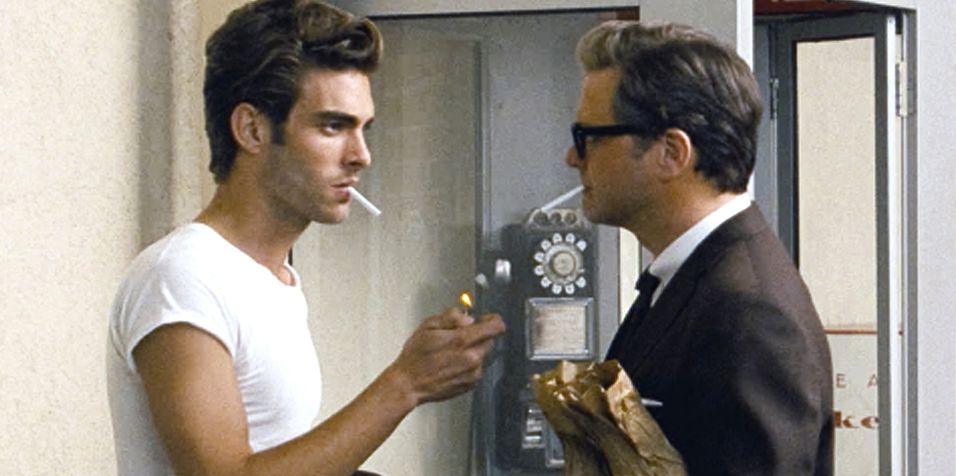
From the photography, scenery, costumes, music, and actors, everything about this movie is beautiful. Of course, it is to be expected from fashion designer turned writer-director Tom Ford. To say that he is good at everything would be an understatement, if only he made more movies. “A Single Man” is his directorial debut and he financed the film himself. The screenplay is based on a book by Christopher Isherwood.
The place is America, the time is the 1960’s Cuban missile crisis. George is an English professor who lost his beloved partner eight months ago. He couldn’t bear to live without him by his side. Throughout the movie, we witness one day in George’s life, but this is not an ordinary day: this is the day that he decides to commit suicide.
Does he change his mind with life’s little gifts, which might involve some romance and friendship? The movie does not go on linearly and that adds a dynamism and gives us a chance to know George better. Ford changes colors every now and then according to its main character’s mood; it may be the creativity that only a fashion genius could bring to a film.
The film overall is a dramatic journey, but what a journey it is. The movie was chosen as the movie of the year by American Film Institute. Colin Firth is George and he really excels at playıng the part, especially in the famous telephone scene. He was nominated for an Oscar and a BAFTA. He won the BAFTA, but not the Oscar; one year later, he won for “The King’s Speech,” but he might as well have won for “A Single Man” and nobody would have said a word. Also starring Julianne Moore, Matthew Goode and Nicholas Hoult, the music composed by Polish musician Abel Korzeniowski enhanced the film’s devastating effect.
Favorite Moment: George kissing a stranger’s Smooth Fox Terrier, the kind of dog he and his partner Jim had. After Jim died in the car crash, he couldn’t even investigate of one of the dogs that couldn’t be found with Jim.
Favorite Quote:
George: “You know that only thing that has made the whole thing worthwhile has been those few times that I was able to truly connect with another person.”
4. Ali: Fear Eats the Soul (1973)
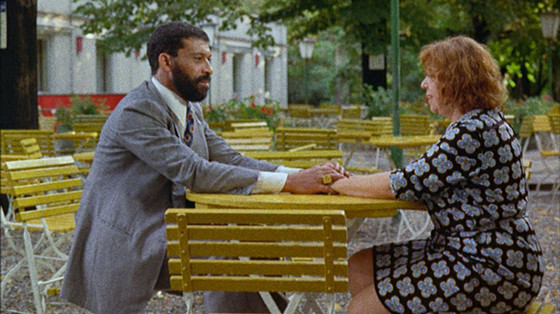
This film shows us that romance can be found even with the two most unlikely people. Emmi (Brigitte Mira) is a German cleaning worker in her 60s; Ali (El Hedi Ben Salem) is a young Moroccan man who works as a mechanic. One day Emmi goes into a bar, which is full of Arab and German people who roll their eyes at her because she acts so awkward. To be able to laugh at her, some girl wants Ali, who is everybody’s crush, to dance with this old lady, and it all starts with a dance. They talk and talk, and here blossoms a romance.
Of course, family and friends and everybody who knows these people are against the relationship, so the odd couple is isolated from society and they have tough times. But somehow they stay together. And just like the beginning, the film ends with a dance where the couple is being honest with each other, and maybe the people just need that in real life to reconcile.
The film was directed by the famous German writer-director Rainer Werner Fassbinder, who is also known for “The Marriage of Maria Braun.” The director made a cameo as the husband of Emmi’s daughter, who is the most racist character in the film. It won two big awards at the Cannes Film Festival in 1974.
Favorite Moment: The scene where they go to a place like a garden full of yellow benches; they sit hand in hand and pour out their troubles while strangers are looking at them with their eyes wide open. It is almost a surrealistic scene in a very realistic movie.
Favorite Quote:
Ali : “Fear eats the soul.”
3. Lost in Translation (2003)
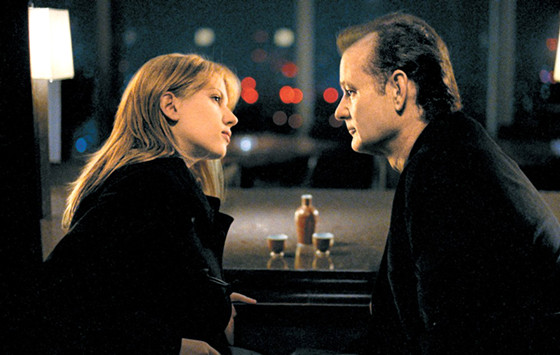
Francis Ford Coppola’s actor-director daughter Sofia Coppola made this independent film festival darling after her famous first feature film “The Virgin Suicides.” She was Oscar nominated for Best Director and Best Original Screenplay for this film. She was the youngest woman and the first American woman who was nominated for a Best Director Oscar. And she won one as the writer with tons of other awards.
The movie tells the story of a middle-aged man named Bob (Bill Murray) and a young woman, Charlotte (Scarlett Johansson) who meet in Japan in a complicated mood. They are both married, but not satisfied with their marriages and the places in their lives at the moment.
Along with a culture shock and loneliness, they first become friends and then get romantically involved. Even though they never say “I love you,” we understand that they fall in love with each other. This is the kind of romance that real people can live in real life. Without saying their feelings for each other, they only talk with their eyes and smiles and everybody understands.
The movie’s ending is proof that this film is too much from real life and not from the dream factory called Hollywood. Coppola wrote the main character with Murray in mind, and the Oscar nomination for Best Actor with this film showed she was right. Murray said that this was his favorite film of his own. The film also catapulted Johansson’s career.
Favorite Moment: The farewell scene of the two main characters who are in love, but who are also aware that they are not going to be able to have a relationship or a future together because they are both married to other people. This scene is also known for the famous whisper which we as the moviegoers couldn’t learn, just like the famous “What’s inside the briefcase” mystery from “Pulp Fiction.”
Favorite Quote:
Bob: “The more you know who you are and what you want, the less you let things upset you.”
2. The Reader (2008)
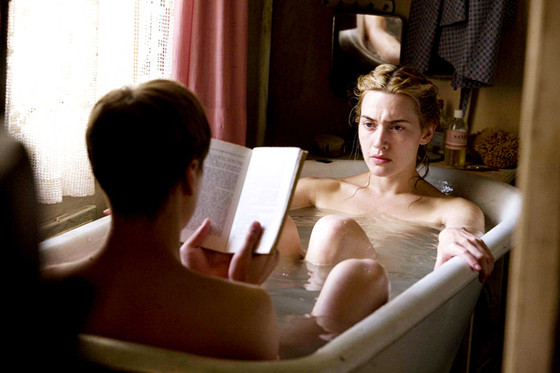
Based on a book by Bernhard Schlink, this film is a tragic story of two characters who meet by coincidence and make their marks on each other’s lives forever. The film is directed by Stephen Daldry (“Billy Elliot”) and stars Kate Winslet as the older woman, David Kross as the younger man, and Ralph Fiennes as the aged younger man.
The atmosphere is somewhat dark and moody: it revolves around West Germany after World War II, but over a long period of time, so we could see the characters’ development. This film makes us ask ourselves questions about humanity, just like the characters we watch. This romance is not for fun, but it makes us think.
If you want to have a heartbreaking film experience, you can trust “The Reader.” Fifth time Oscar nominee Winslet won the Academy Award for Best Actress in a Leading Role and rightly so. While the boy’s character was played by two different actors at different ages, Winslet was the only actor for the other party of the love story and she played her beautifully.
Favorite Moment: The scene in prison where they meet again after all these years. We can see the big age difference of the characters now, and although she might be a cruel person who did those awful things in Auschwitz, her eyes tell us that she still has only love for the man in front of her. But of course, he can’t forgive her and see the woman he once loved.
Favorite Quote:
Michael: “I’m not frightened. I’m not frightened of anything. The more I suffer, the more I love. Danger will only increase my love. It will sharpen it, it will give it spice. I will be the only angel you need. You will leave life even more beautiful than you entered it. Heaven will take you back and look at you and say: only one thing can make a soul complete, and that thing is love.”
1. Leon: The Professional (1994)
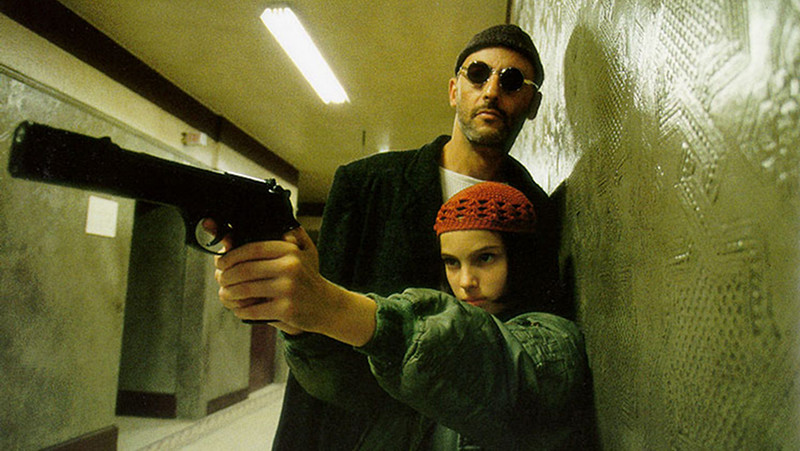
Can an assassin be likable? If he is a milk-drinking, plant-loving and Gene Kelly musical-watching one played by famous French actor Jean Reno, the answer might just be YES. The director is Luc Besson, who at the time was known for “Le Grand Bleu” and “Nikita” (also with Reno). Also starring in her first acting job is Oscar-winning actor Natalie Portman, and in one of his most famous villains, the biggest Beethoven fan Norman Stansfield, the master of the bad guys, last year’s Oscar winner Gary Oldman.
Leon is a middle-aged Italian guy who “cleans” people for a living. One day he helps a little girl named Mathilda, saves her life, and becomes responsible for the rest of her life. They start to live together, even clean together. They develop a strange relationship, one that might be looked at as a romance and a big admiration if we’re looking from Mathilda’s eyes; and even though they say they love each other, from Leon’s point of view, it may be a love for a helpless little child who becomes also his only friend in his lonely world.
But the tragedy that starts their relationship doesn’t let them go. In short, the movie tugs at your heartstrings with the help of the beautiful music composed by Eric Serra, but especially at the end, when Mathilda decides to have roots in a school by the company of Sting’s timeless song “Shape of My Heart.”
Favorite Moment: Mathilda and Leon playing a game of ‘guess who’ with characters like Madonna, Marilyn Monroe, Charlie Chaplin, Gene Kelly and John Wayne. This is the scene where a child and a childlike hitman become the humans they are and forget the dramatic tone and vengeful theme of the movie.
Favorite Quote:
Mathilda: “Is life always this hard, or is it just when you are a kid?”
Leon : “Always like this.”